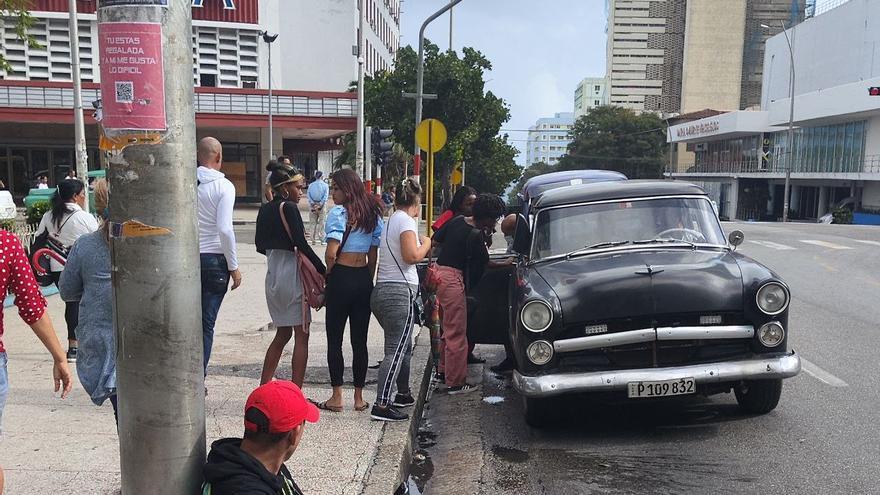
![]() 14ymedio, Madrid, November 2, 2023 — The fight for a seat in an almendrón* (shared taxi) has become more evident in recent days. The drivers go right by the eternal lines at the gas stations because all they have is gasoline. “There’s no place for us to buy, there’s no diesel* anywhere,” a taxi driver tells 14ymedio.
14ymedio, Madrid, November 2, 2023 — The fight for a seat in an almendrón* (shared taxi) has become more evident in recent days. The drivers go right by the eternal lines at the gas stations because all they have is gasoline. “There’s no place for us to buy, there’s no diesel* anywhere,” a taxi driver tells 14ymedio.
The fuel situation, far from what President Miguel Díaz-Canel claimed last Monday and as this newspaper verified, has not been resolved. After the fat times in September, with the shipment from Venezuela of 86,000 barrels per day (bpd) of crude oil, fuel oil, diesel and gasoline, October has brought lean times. According to Reuters data, Caracas sent its political ally barely 32,000 bpd in October, although it’s true that the cargo of two oil tankers (one with 300,000 barrels of crude oil and the other with 320,000 barrels of fuel oil), which arrived in Cuba at the beginning of October, was counted in the September data.
Export data are bad globally for the state-owned Petróleos de Venezuela (Pdvsa), which sent just 700,000 bpd of crude oil and its derivatives, compared to 812,000 bpd last month. As far as derivatives and other petrochemicals are concerned, the decline is also strong. From the 324,000 metric tons in September, it dropped to 228,500 in October.
Export data are bad globally for the state-owned Petróleos de Venezuela (Pdvsa), which sent just 700,000 bpd of crude oil and its derivatives, compared to 812,000 bpd in October
In this case, the fall is mainly due to the lack of dilutent and power outages. Just three days ago, in addition, the refining capacity of the Paraguaná plant collapsed. The plant had processed 955,000 bpd, but after a fire and the lack of raw material, it achieved only 94,000 barrels this Monday, 10% of the usual.
Of the four units in this refinery, one of them suffered a fire on Saturday in which there was no personal injury, but it drastically reduced production. It usually produces 30,000 bpd, according to Reuters sources, who maintained that work was already being done “in unsafe conditions and with diesel leaks before the fire.” In addition, low crude oil inventories forced one of the units of another neighboring refinery, Amuay, to stop.
The situation has led to a bad month for the accounts of PDVSA, which returned to sending most of the oil produced to China. The amount has not been specified, but it did exceed what was sent to the United States, which received 178,290 bpd, much more than the previous months. Thanks to the license obtained by Chevron from the Department of State, Venezuela sent 147,000 bpd in August and 145,000 bpd in September. Now, the amount has increased at a time when political tension rises again between the two countries.
Last month, Washington broadly eased sanctions on Venezuela’s oil and gold sectors, authorizing the country to export crude oil, fuel and gas freely for six months. The suspension of sanctions was subject to the Barbados agreements, signed between Venezuela’s chavismo and its opposition with the United States, the European Union and Canada as guarantors, to try to promote clean presidential elections.
“The Treasury Department is prepared to modify or revoke authorizations at any time, in case Maduro’s representatives do not comply with their commitments,” said the Department in charge of the measure.
Now, when Venezuela is trying to boycott the election of Maria Corina Machado as an opposition candidate claiming that she was disqualified, the United States affirms that it will take measures “if Maduro and his representatives do not meet the commitments within the framework of the electoral road map.” Meanwhile, for his part, Diosdado Cabello, number two of the Venezuelan regime, maintains that it is Washington who does not fulfill its part, despite the fact that there was no pact between the two countries.
In the midst of this turbulence, and with Venezuela buying fuel outside its borders, Cuba continues to receive free of charge, with ups and downs, the amounts agreed between Hugo Chávez and Fidel Castro 23 years ago, estimated at an average of at least 55,000 bpd.
In addition, Havana continues to receive significant amounts from its renewed suppliers, Russia and, above all, Mexico, which has already become its second supplier, although Pemex is currently studying how to trade with the Island so as not to incur sanctions after sending 3,510,000 barrels of fuel, with a value of 258.8 million dollars since March 2023, calling it a “donation.”
*Translator’s note: Almendron borrows the Spanish word for ‘almond’ to refer to old American cars, and is derived from their ‘almond-shape,’ and has also come to mean taxi, as the cars commonly provide that service. Originally built to run on gasoline, over the years the almendrones have been converted to diesel.
Translated by Regina Anavy
____________
COLLABORATE WITH OUR WORK: The 14ymedio team is committed to practicing serious journalism that reflects Cuba’s reality in all its depth. Thank you for joining us on this long journey. We invite you to continue supporting us by becoming a member of 14ymedio now. Together we can continue transforming journalism in Cuba.
